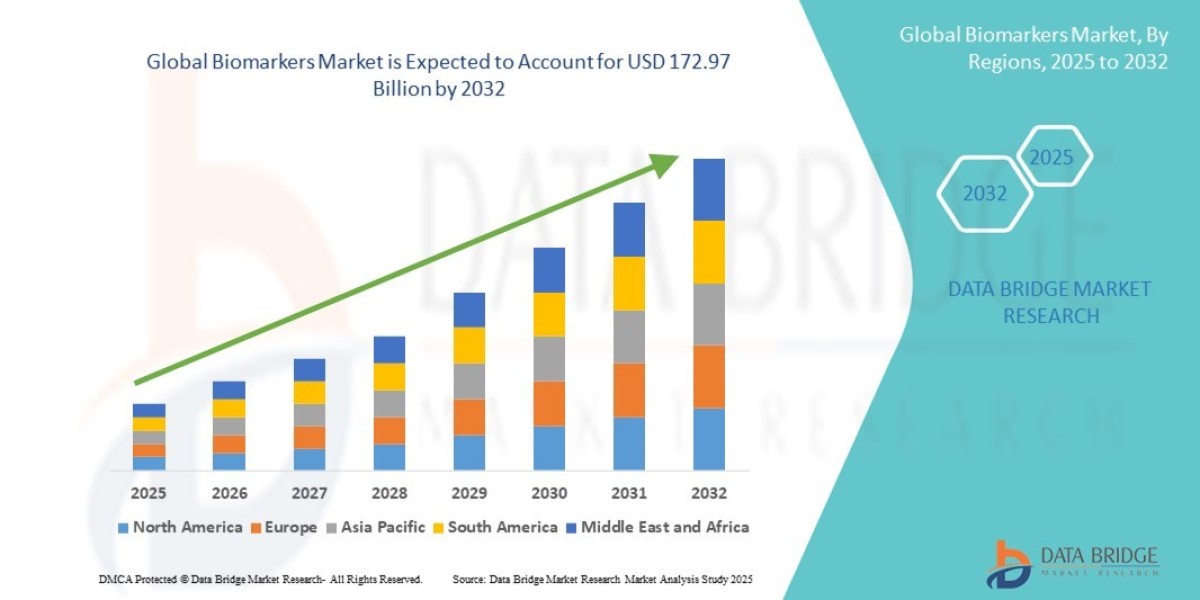Introduction
The Biomarkers Market represents one of the most dynamic and essential sectors within the global healthcare and biotechnology industries. Biomarkers are measurable biological indicators that reflect physiological, pathological, or pharmacological responses to treatment or disease progression. They are critical in diagnostics, drug discovery, personalized medicine, and disease monitoring.
The market’s growth is driven by advancements in genomics, proteomics, and bioinformatics, coupled with the increasing prevalence of chronic diseases such as cancer, cardiovascular disorders, and neurological conditions.
Biomarkers have become indispensable in modern healthcare systems. They enable early disease detection, improve clinical outcomes, and optimize therapeutic decisions. Their integration into clinical trials has reduced drug development timelines and enhanced regulatory approvals. The rise of precision medicine and companion diagnostics has further strengthened the biomarker ecosystem, transforming patient care from reactive to proactive management.
Learn how the Biomarkers Market is evolving—insights, trends, and opportunities await. Download report: https://www.databridgemarketresearch.com/reports/global-biomarkers-market
The Evolution
The evolution of the biomarkers market reflects decades of progress in molecular biology, biotechnology, and computational science. The initial concept of biomarkers emerged in the mid-20th century, when scientists began identifying measurable biological substances linked to disease conditions, such as glucose for diabetes monitoring.
The 1980s and 1990s witnessed rapid expansion with the advent of genomic sequencing and proteomic profiling, which allowed the identification of genetic and protein-based markers associated with specific diseases. The completion of the Human Genome Project in 2003 marked a turning point, enabling researchers to identify thousands of potential biomarkers for diagnostic and therapeutic applications.
The integration of next-generation sequencing (NGS), mass spectrometry, and bioinformatics in the 21st century revolutionized biomarker discovery and validation. Pharmaceutical companies began incorporating biomarkers into drug development pipelines to predict patient responses and monitor treatment efficacy.
Today, biomarkers are at the core of personalized and precision medicine. They enable tailored treatment approaches that improve efficacy and minimize adverse effects. In oncology, biomarkers such as PD-L1, HER2, and BRCA mutations guide targeted therapies, while in neurology, biomarkers like tau and amyloid beta are vital in Alzheimer’s research.
The modern biomarkers industry is now embracing digital biomarkers derived from wearable devices and biosensors, expanding applications into digital health monitoring and remote patient care.
Market Trends
The biomarkers market is influenced by several key trends reflecting scientific, technological, and clinical developments across the healthcare landscape.
1. Growing Adoption of Precision Medicine
The shift toward precision and personalized healthcare is driving biomarker utilization. Physicians rely on biomarker-based diagnostics to design targeted treatment plans, reducing trial-and-error approaches and improving patient outcomes.
2. Expansion of Oncology Biomarkers
Cancer diagnostics and treatment represent the largest biomarker application area. The rise in cancer incidence has accelerated the use of genomic and proteomic biomarkers for early detection and therapy selection.
3. Integration of Artificial Intelligence (AI) and Machine Learning (ML)
AI and ML algorithms are being employed to identify novel biomarkers from large datasets, enabling predictive modeling and faster discovery processes.
4. Growth in Companion Diagnostics
The development of companion diagnostics that link biomarkers to specific therapeutic drugs is reshaping pharmaceutical strategies, ensuring drug safety and efficacy across patient populations.
5. Rise of Digital and Wearable Biomarkers
Digital biomarkers, derived from mobile devices, wearables, and health apps, are gaining attention in chronic disease management and real-time patient monitoring.
6. Regulatory Support and Standardization Efforts
Regulatory bodies such as the FDA and EMA are promoting biomarker qualification programs, enhancing clinical trial design and accelerating market approvals.
7. Expansion into Neurological and Autoimmune Diseases
Biomarker research is expanding beyond oncology into areas like Alzheimer’s, Parkinson’s, multiple sclerosis, and rheumatoid arthritis, broadening market potential.
8. Technological Advancements in Omics Sciences
Integration of genomics, metabolomics, and transcriptomics allows comprehensive biomarker profiling, improving diagnostic precision and research efficiency.
Challenges
While the biomarkers market is growing rapidly, several challenges affect its overall expansion and adoption.
1. High Cost of Biomarker Validation and Clinical Trials
Developing and validating biomarkers requires extensive research, clinical testing, and regulatory compliance, increasing overall costs and time to market.
2. Complexity of Biological Systems
The multifactorial nature of diseases complicates biomarker identification and reproducibility, particularly in heterogeneous conditions like cancer and autoimmune disorders.
3. Regulatory and Ethical Concerns
The lack of standardized regulatory frameworks across countries poses challenges in biomarker qualification and approval. Ethical concerns regarding genetic data privacy also hinder progress.
4. Limited Reimbursement Policies
In many regions, reimbursement for biomarker-based diagnostics is insufficient, limiting patient accessibility and clinical adoption.
5. Data Integration and Management Issues
Handling large-scale biological and clinical data from diverse sources requires robust computational infrastructure and interoperability between systems.
6. Skill Gap and Resource Constraints
A shortage of skilled professionals in bioinformatics, molecular diagnostics, and biostatistics affects biomarker research and implementation efficiency.
7. Variability in Clinical Outcomes
Biomarker-based diagnostics may yield inconsistent results across populations due to genetic diversity and environmental factors, necessitating further validation.
Market Scope
The biomarkers market encompasses diverse segments based on type, application, technology, and end-user industries, with widespread adoption across clinical and research settings.
Segmentation by Type:
Safety Biomarkers – Monitor toxicity or adverse effects during drug development.
Efficacy Biomarkers – Measure therapeutic responses to specific treatments.
Validation Biomarkers – Confirm biological relevance of identified targets.
Diagnostic Biomarkers – Aid in disease detection and classification.
Prognostic and Predictive Biomarkers – Assess disease progression or treatment response.
Segmentation by Application:
Disease Diagnostics
Drug Discovery and Development
Personalized Medicine
Risk Assessment and Prognosis
Clinical Trials
Segmentation by Technology:
Genomics
Proteomics
Metabolomics
Imaging Technologies
Bioinformatics Platforms
Segmentation by End-User:
Pharmaceutical and Biotechnology Companies
Diagnostic Laboratories
Research and Academic Institutes
Hospitals and Clinics
Contract Research Organizations (CROs)
Regional Analysis
North America
North America dominates the global biomarkers market with a share exceeding 40%. The United States leads due to advanced healthcare infrastructure, high R&D spending, and strong presence of pharmaceutical giants. The region’s emphasis on personalized medicine, coupled with supportive FDA guidelines for biomarker-based diagnostics, drives growth.
Europe
Europe represents the second-largest market, with significant contributions from the UK, Germany, and France. EU initiatives for genomic research and early disease detection support biomarker development. The region’s pharmaceutical ecosystem and academic research collaborations foster innovation.
Asia-Pacific
Asia-Pacific is the fastest-growing market, driven by rising healthcare investments, expanding biotechnology sectors, and increasing cancer incidence. Countries like China, Japan, and India are investing heavily in molecular diagnostics and precision medicine research.
Latin America
Latin America’s market is gradually expanding, with Brazil and Mexico leading adoption in cancer and infectious disease biomarkers. Growing healthcare infrastructure and research funding are improving accessibility to advanced diagnostics.
Middle East & Africa
The Middle East and Africa are emerging markets with potential growth in diagnostic applications and public health monitoring. Government initiatives for early disease screening are supporting biomarker integration into healthcare systems.
Market Size and Factors Driving Growth
The global biomarkers market size was valued at USD 56.94 billion in 2024 and is expected to reach USD 172.97 billion by 2032, at a CAGR of 14.90% during the forecast period
Key Growth Drivers:
1. Rising Prevalence of Chronic Diseases
The global increase in cancer, diabetes, and cardiovascular diseases drives biomarker adoption for early detection and monitoring.
2. Technological Innovations in Genomics and Proteomics
Advances in sequencing technologies and proteomic platforms accelerate biomarker discovery and validation.
3. Expansion of Precision and Personalized Medicine
The shift toward individualized treatment approaches enhances the demand for predictive and diagnostic biomarkers.
4. Growing Pharmaceutical R&D Investments
Biomarkers improve clinical trial efficiency, reducing costs and time-to-market for new drugs.
5. Regulatory Support for Biomarker-Based Approvals
Agencies like the FDA and EMA are increasingly approving biomarker-guided drugs, accelerating industry adoption.
6. Integration of Digital Health and AI
AI-driven analytics improve data interpretation, leading to faster identification of viable biomarkers.
7. Rising Aging Population
An aging global population increases disease incidence, expanding the need for advanced diagnostic biomarkers.
8. Collaborations and Partnerships
Joint ventures between pharma, biotech, and academic institutions enhance biomarker development pipelines.
Opportunities in Emerging Regions
Emerging economies offer growth potential through government-funded healthcare programs, increasing investments in clinical research, and growing awareness of early disease detection benefits.
Conclusion
The Biomarkers Market is poised for transformative growth through 2035, fueled by technological innovation, precision medicine initiatives, and expanding applications in diagnostics and therapeutics.
Continuous innovation, digital integration, and regulatory collaboration will be essential for overcoming existing challenges in validation, standardization, and data management. Biomarkers will remain central to the evolution of healthcare, offering solutions for early disease detection, improved treatment outcomes, and efficient drug development.
For stakeholders, the future promises significant opportunities in companion diagnostics, AI-enabled discovery, and personalized treatment solutions that redefine the global healthcare paradigm.
Frequently Asked Questions (FAQ)
1. What is the Biomarkers Market?
The biomarkers market focuses on discovering, developing, and commercializing biological indicators used in disease diagnosis, drug development, and personalized medicine.
2. What is the current market size?
The global biomarkers market is valued at USD 71.4 billion in 2025.
3. What is the projected market size by 2035?
The market is expected to reach USD 175.9 billion by 2035, growing at a CAGR of 9.5%.
4. What are the key applications of biomarkers?
Biomarkers are widely used in disease diagnosis, drug discovery, clinical trials, and personalized treatment approaches.
5. Which technology dominates the market?
Genomics and proteomics are the leading technologies used for biomarker identification and validation.
6. What factors are driving market growth?
Rising chronic disease prevalence, technological advances, regulatory support, and precision medicine initiatives are major growth drivers.
7. Which region leads the market?
North America holds the largest share, followed by Europe and Asia-Pacific.
8. What are the major challenges in the biomarker industry?
High development costs, regulatory barriers, data integration issues, and lack of reimbursement policies are key challenges.
9. Who are the primary end-users of biomarkers?
Pharmaceutical companies, diagnostic laboratories, research institutes, and hospitals are the primary end-users.
10. What is the future outlook for the biomarkers market?
The market will continue expanding as innovations in digital health, genomics, and precision medicine enhance diagnostic accuracy and therapeutic efficiency.
Browse More Reports:
Global Dental Biomaterials Market
Global Dental CAD/CAM Systems Market
Global Dental Restorative and Regenerative Material Market
Global Deployable Military Shelter Systems Market
Global Diabetic Food Market
Global Diaper and Sanitary Napkin Converting Machine Market
Global Di-electric Gases Market
Global Digital Light Processing Chipset Market
Global Digital Map Market
Global Digital X-Ray Market
Global Dilated Cardiomyopathy Market
Global District Cooling Market
Global Dried Honey Market
Global Dry Bulk Shipping Market
Global Duchenne Muscular Dystrophy Treatment Market
About Data Bridge Market Research:
An absolute way to forecast what the future holds is to comprehend the trend today!
Data Bridge Market Research set forth itself as an unconventional and neoteric market research and consulting firm with an unparalleled level of resilience and integrated approaches. We are determined to unearth the best market opportunities and foster efficient information for your business to thrive in the market. Data Bridge endeavors to provide appropriate solutions to the complex business challenges and initiates an effortless decision-making process. Data Bridge is an aftermath of sheer wisdom and experience which was formulated and framed in the year 2015 in Pune.
Contact Us:
Data Bridge Market Research
US: +1 614 591 3140
UK: +44 845 154 9652
APAC : +653 1251 975
Email:- corporatesales@databridgemarketresearch.com
"







